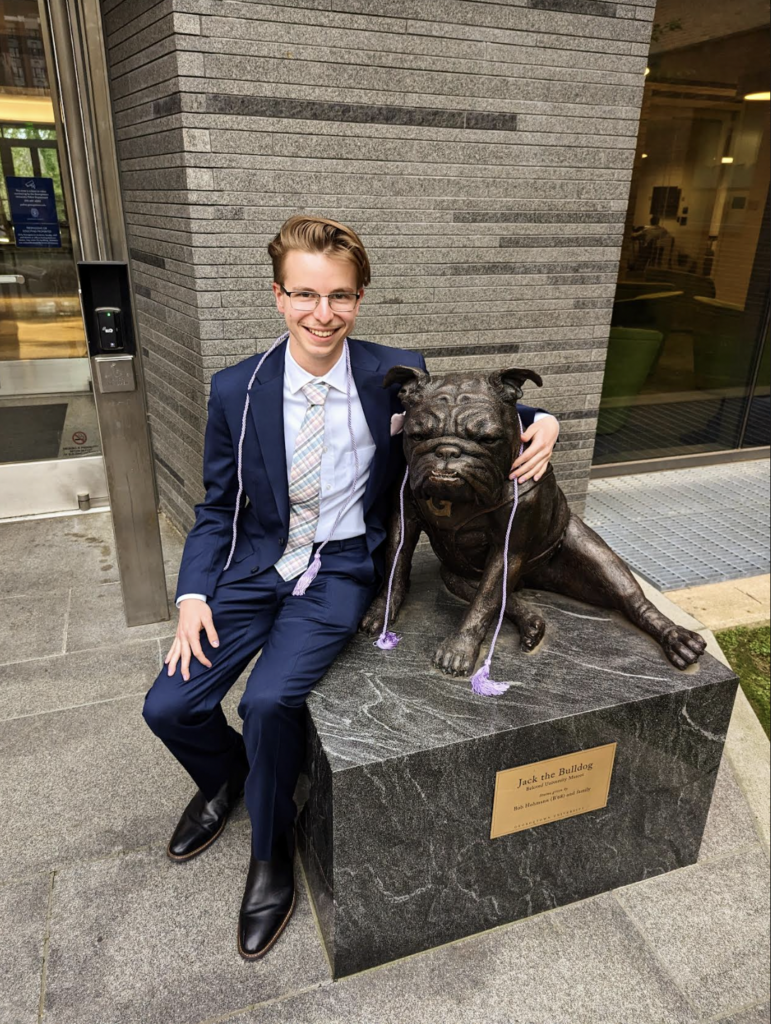Announcing our Global Medieval Studies Awards for Academic Excellence
Posted in Announcements Student
This year the Global Medieval Studies Program solicited nominations from our Affiliated Faculty for student research projects deserving of special recognition. We are pleased to announce six Global Medieval Studies Awards for Academic Excellence from 2023.
Sarah McNamer
Director, Global Medieval Studies Program
Awards for Academic Excellence
Kelvin Doe. Kelvin Doe’s thesis, submitted for Honors in History, “Rewriting Inconvenient Truths: How Charlemagne Rewrote his Ancestry to Justify his Leadership,” tackles a well-trodden topic — history writing in Frankish Europe. But despite the quantity of scholarship on the topic, he has crafted a sharply original interpretation of the agendas underlying the writing and rewriting of elite Frankish genealogies. His thesis is rooted in a careful reading of a range of early medieval texts and multiple generations of modern scholarship. The thesis demonstrates clearly that ancestry could be (and was) crafted to suit specific purposes, and that we, as moderns, have on occasion been too willing to accept early medieval accounts of lineage at face value, just as early medieval authors hoped their readers would. Mentor: Professor Tim Newfield. Congratulations, Kelvin!

Brett Guessford. As a Global Medieval Studies minor, Brett completed a capstone project titled “Medieval Cultures of Resistance: Building a Framework to Explore Everyday Aesthetic Defiance against Foreign Invasion through the Examples of Irish and Chinese Societies from the Twelfth to the Fourteenth Century.” This research project, submitted to MVST 348, Advanced Research in Global Medieval Studies, focused on aspects of the aesthetics of material culture to learn more about a society’s cohesiveness and sense of self-identification in the face of external threats. With case studies from medieval Ireland and China, Brett explored how resistance to oppression was expressed in art, symbology and customs. Mentor: Professor Sarah McNamer. Congratulations, Brett!
Katie Hawkinson. Katie Hawkinson’s thesis, “Reframing Citizenship and Social Class: Christine de Pizan’s Politics in Sixteenth-Century English Translation,” was submitted to the Department of History. Katie offers the first look at the political meaning of the English translation and later publication, in 1521, of two of Christine de Pizan’s works. Scholars have long treated the literary side of Christine’s works, but Katie shows how Christine’s most famous work, Le livre de la cité des dames, has never gotten sufficient attention for its daring political assertion of women’s political rights. The French cité was the translation of the Latin civitas, or political community of citizens. The second work to appear in 1521 was her Livre du corps de policie [1406] which provided the standard French vision of the body politic for the next two centuries. Christine’s literary work got to England in her lifetime and Anthony Woodville, brother of Elizabeth, who married Edward VI, translated Christine’s work. Katie shows how the English translations radicalized Christine’s vision by offering a distinctive view of the “policie” of her title and by modifying Christine’s negative view of overly democratic political participation. Katie relates these texts to contemporaneous English ones, and shows the critical role of women, like Katherine of Aragon, in popularizing Christine in England. Mentor: Professor Jim Collins. Congratulations, Katie!

Thomas Ronan. Thomas Ronan’s honors thesis, submitted to the Department of Italian, investigates a previously unexamined interpretive issue concerning Cato and Matelda, two major figures in Dante’s Purgatorio. Written in Italian, as Similitudini concettuali e funzionali fra Catone e Matelda nel Purgatorio dantesco [“Conceptual and Functional Ties between Cato and Matelda in Dante’s Purgatory”], Thomas’s thesis deploys an interdisciplinary approach combining historical, philosophical, and literary perspectives to provide an interpretation grounded in solid Dante scholarship. Mentor: Professor Francesco Ciabattoni. Congratulations, Thomas!
Dan Sachs. Dan Sachs wrote his senior thesis for Jewish Civilization on the twelfth-century poet, Judah Halevi. Titled “Judah Halevi: A National Poet at the Edge of His Nation,” Dan’s thesis looks at the themes of longing and despair in Halevi’s poetry, considering the longing for a deeper bond with God as well as the difficulties of living as a subjugated minority among Christians and Muslims. In his analysis of both themes, Dan raises questions about both the universal and the particularly Jewish aspects of religious and political despair. Mentor: Professor Jonathan Ray. Congratulations, Dan!
Mel Smith. Mel Smith’s honors thesis for her degree in Global Medieval Studies is notable for its interdisciplinarity and reassessment of several longstanding beliefs about western Steppe peoples integral to narratives about the decline of the Roman empire and Europe’s ‘migration era’. The crossings of the Danube of the Huns and Avars are often discussed but rarely explored. Here they are re-read in many Latin and Greek texts and situated into many environmental contexts. Though environmental determinism remains fashionable in late antique studies, Mel’s bucks the trend, arguing, with written and paleoclimate evidence considered, that multiple factors explained why Steppe incursions happened when they did. And instead of zeroing in on horses, the focus turns, surprisingly, to boats. The title of her 145-page thesis is “Hold Your Horses, the Huns Used Boats?: The Dynamic Feedback Loops Between Steppe Incursions, the Danube River, and the Eastern Roman Empire.” Mentor: Professor Tim Newfield. Congratulations, Mel!
